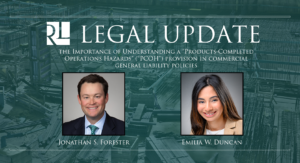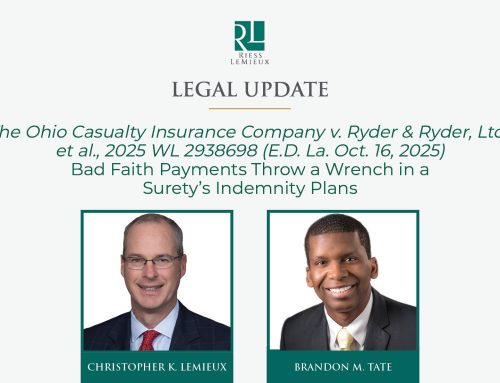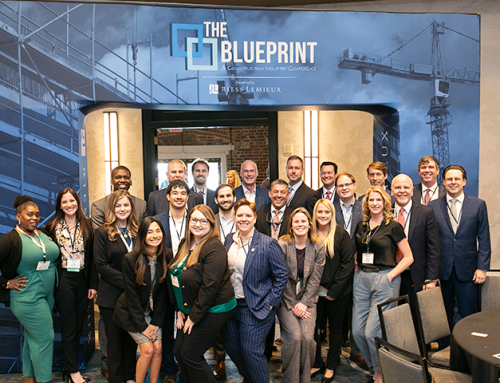 Are you Covered? – the Importance of Understanding a “Products-Completed Operations Hazards” (“PCOH”) provision in commercial general liability policies.
Are you Covered? – the Importance of Understanding a “Products-Completed Operations Hazards” (“PCOH”) provision in commercial general liability policies.
Authors: Jonathan S. Forester and Emilia W. Duncan
A recent Fifth Circuit decision examines claims arising out of faulty workmanship and provides key insight for when such claims are covered by a “Products-Completed Operations Hazards” (“PCOH”) exception to an exclusion under a commercial general liability (“CGL”) insurance policy.
In Commercial Chemical Products, Inc. v. Jake’s Towing, LLC, Commercial Chemical Products, Inc. d/b/a Poolsure, Plaintiff, contracted Jake’s Towing, Defendant/Insured, to perform repairs to an oil leak and change the oil in one of its trucks. A few days later, Defendant advised Plaintiff the truck was ready to be picked up from Defendant’s facility in Boutte, Louisiana and that the repairs were complete. When Plaintiff arrived at Defendant’s facility to pick up the truck, one of the Defendant’s technicians turned on the truck and “drove it approximately 200 feet” despite the low engine warning light indicating the truck had insufficient oil.
As a result, the truck sustained substantial engine damage and Plaintiff filed suit for Breach of Contract against Defendant and its insurer, AXIS for the resulting damage caused by the Defendant’s faulty workmanship. As discussed further below, it is important to note that Plaintiff’s truck was still on Defendant/Insured’s property when the engine damage occurred.
On Motion for Summary Judgment, the Insurer argued that engine damage caused by Defendant’s faulty repair, was specifically excluded under the “Damage to Your Work” exclusion and precluded coverage for damages arising from faulty workmanship. The trial court denied summary judgment as to the “Damage to Your Work” exclusion, leading to the Insurer applying for supervisory review.
In the Insurer’s writ application, it asserted that the trial court erred in denying summary judgment based on exclusions in the policy which preclude coverage of the resulting damage arising from the Insured’s faulty workmanship. Plaintiff argued that the PCOH exception to the exclusions applied and covered the resulting engine damage. On review, the Fifth Circuit first looked to the “Damage to Your Work” exclusion and the PCOH exception provision, to determine the intent of the policy regarding coverage for damage resulting from faulty work.
Under the “Damage to Your Work” exclusion, coverage is excluded for “Property Damage” to “that particular part of any property that must be restored, repaired, or replaced because ‘your work’ was incorrectly performed on it.” However, under the PCOH provision, coverage is provided for “bodily injury” and “property damage” occurring away from the Insured’s premises and arising out of “your product” or “your work” except, (1) when the products are still in the Insured’s physical possession; and (2) when work that has not yet been completed or abandoned.
The PCOH further provided, “work that may need service, maintenance, correction, repair or replacement, but which is otherwise complete, will be treated as completed.”
While Plaintiff argued that the PCOH exception applied since the work, i.e. the repair of truck’s oil leak, was complete at the time the damage occurred, the Insurer argued that the PCOH exception did not apply because the engine sustained the damage at issue while the truck was still on the Defendant/Insured’s premises and in Defendant/Insured’s physical possession.
Agreeing with the Insurer, the Fifth Circuit stated, “the plain language of the PCOH exception clearly states that [the PCOH] only applies when the property damage occurs away from the insured’s premises.” In the court’s discussion, the Fifth Circuit cites to Vintage Contracting, LLC, v. Dixie Bldg. Material Co., Inc., stating a PCOH provision only provides coverage “for the risk of liability arising out of products after they left the hands of the insured or for the insured’s exposure to liability arising out of completed work performed away from the insured’s premises.” Ultimately, the Fifth Circuit held because the resulting engine damage occurred on the Defendant’s property, the PCOH exception was not applicable.
We note, since the work, i.e. the repairs to the truck, was performed at the Insured’s facility and the damage occurred on the premises, the Fifth Circuit did not address the issue of whether the work was considered complete. However, even though the Fifth Circuit found that the PCOH was not applicable here, this case still provides crucial insight into how and when PCOH provisions are applied and the importance of understanding the provisions and exclusions in a CGL policy. This opinion clearly demonstrates that disputes over the applicability of PCOH provisions are heavily fact intensive. Consider this: Had the engine damage to Plaintiff’s truck, resulting from the Defendant’s faulty repair, occurred right after the truck was driven off of the Insured’s lot, the Fifth Circuit might have found that the resulting damage was covered by the policy under the PCOH provision.
The reality is that the insurance industry will more often than not try to avoid coverage for claims resulting from their insured’s faulty workmanship, which is why when it comes to coverage disputes over the applicability of exclusions and PCOH provisions, specific facts can make or break a case. Overall, Commercial Chemical Products, Inc., is an important reminder to pay attention to the details and facts of claims, especially for claims involving resulting damage caused by allegedly defective work.



